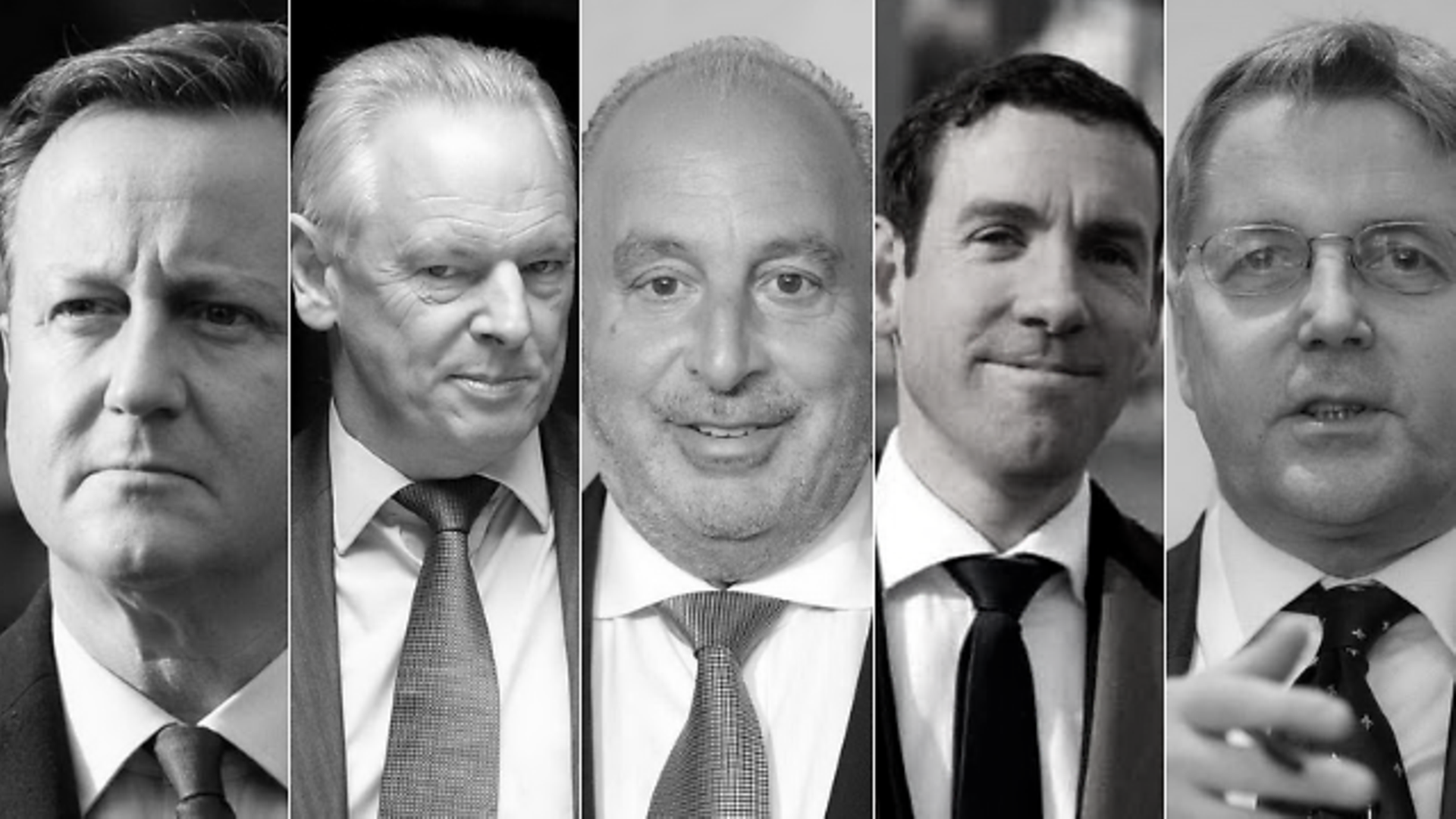
The Greensill scandal has exposed long-running tensions caused by a decision to allow business interests into the corridors of Whitehall
In May 2010, Gordon Brown left a handwritten note to David Cameron, the incoming prime minister, with a simple message: “The country is in good hands. Jeremy is running it.”
Nine years later, Brown’s telling of the story drew a respectful titter among mourners attending the Westminster Abbey funeral of Jeremy Heywood. Five prime ministers – Sir John Major, Tony Blair, David Cameron, Theresa May and Brown himself – were present, a tribute to the man lauded as the finest civil servant of his generation.
Heywood was just 56 when he succumbed to cancer. Every speaker, in person and on video, celebrated the cabinet secretary’s intellect, industry and ability to manipulate the strings of power, irrespective of which party held them. “Whatever the problem,” says a long-time friend, “Jeremy could always see a solution.”
In the early days of the Conservative-Liberal Democrat coalition, before Brexit transfixed successive Tory governments, the problem was finding “value for money”. The global financial crisis had wreaked havoc with the public finances. Finding efficiencies, notably in the multi-billion pound procurement budget, was urgent.
The answer – or so Heywood thought – was Lex Greensill, an Australian banker whom he had met during a brief stint at Morgan Stanley, the Wall Street investment bank. Greensill could talk the hind legs off a koala bear, especially when he reminisced about growing up on a sweet potato and water melon farm in Bundaberg, a small town north of Brisbane in Queensland.
By his account, the Greensill family business was often the victim of late payments from its customers. His big new idea was to “democratise” supply chain finance, making it easier for the little people to get paid on time.
In practice, supply chain finance was a fancy term for the age-old practice of invoice factoring, where a supplier needing money gets the invoice paid quickly by the factor, at a discount. The factor gets the full invoice paid later by the purchaser. The difference is profit.
Greensill’s conceit was to turn the model upside down, offering “reverse factoring” and a bit of financial engineering. This involved taking a cut from the purchaser, in this case the government or blue-chip companies, and packaging the debt into short-term bonds available to investors.
When Greensill first turned up in Whitehall government, he was met with polite scepticism. A former senior civil servant who met Greensill told me “reverse factoring” made no sense. “Either the relevant department could be ordered to pay suppliers on time or the government could set up a ‘bad debt’ facility.”
Fast forward to 2011, when Greensill, having set up his own eponymous company, returned to plead his case. The timing was doubly fortunate. Heywood, now back in government, was poised to ascend to cabinet secretary. Even more important, a management revolution was underway in Whitehall.
David Cameron had authorised a wildly ambitious reorganisation of the NHS as well as an overhaul of government procurement and oversight of the civil service, led by ex-minister Francis Maude. At the epicentre was the Cabinet Office, where a succession of business people turned up offering advice and expertise, among them Lex Greensill.
Heywood, having served as principal private secretary to several chancellors and two prime ministers (Blair and Brown), was happy to let Maude take the lead. He was the ultimate consigliere, more interested in policy and retaining the confidence of his bosses than running the civil service.
The system was obliged to adjust to his needs. Cameron approved the appointment of a senior civil servant
(Sir Bob Kerslake) as head of the home civil service, in addition to his existing role of local government permanent secretary. When that experiment failed to work, John Manzoni, a former BP executive, was called in. Manzoni, who had headed The Major Projects Agency, was given a highfalutin title (chief executive of the Civil Service) and as well as Cabinet Office permanent secretary. He resigned from two private sector posts, but was allowed to retain a lucrative non-executive directorship of SABMiller, the brewing giant.
Prevailing sentiment was that business knew best. In 2010, Lord John Browne, the former BP boss, had helped recruit 60 non executive directors (NEDs) to serve on boards overseeing government departments. Maude meanwhile commissioned a review of efficiency led by Sir Philip Green, the later disgraced retail billionaire.
Yet behind the flurry of activity, there were tensions, subsequently laid bare by the implosion of Greensill Capital and the lobbying activities of David Cameron as paid advisor, now the subject of nine (and counting) official inquiries, including parliamentary committees.
First, the rules governing the movement of business people in and out of Whitehall were opaque at best. Greensill himself was a newly-minted ‘Crown Representative’, equipped with a business card and high level security clearance; but he was also a businessman with a direct, if undeclared interest in procurement.
This ‘double-hatting’ took on surreal dimensions when the government’s chief procurement officer Bill Crothers, in charge of a £40bn budget, joined Greensill as a part time adviser in September 2015, two months before leaving the civil service. Crothers later became a Greensill director, with Cabinet Office approval.
Second, Acoba (the Advisory Committee on Business Appointments) led by Lord Eric Pickles is toothless. It can write letters of censure, but has no power to fine. Exiting ministers treat the committee with disdain, barely bothering to notify the committee of changes in employment. (Boris Johnson returned to his column at the Daily Telegraph the week after resigning as foreign secretary. When criticised, he pleaded ignorance of the rules).
Third, according to Whitehall officials, there has been a breakdown in record-keeping of contacts and conversations between ministers and lobbyists. Unlike the days of Yes Minister, when the private secretary listens in on the key call, sensitive communications usually take place via mobile phone or WhatsApp (Cameron’s medium of choice). Email is never used for sensitive exchanges because of potential disclosure following subject access requests.
Fourth, the role of the NEDs has become increasingly blurred – some might say, corrupted – by the forces of patronage. Ten years on from the original Maude experiment, the civil service boards are populated by party donors and political chums rather than seasoned executives looking to serve the public interest.
In May 2020, for example, Michael Gove announced four new NEDs for the Cabinet Office which he oversees. They include: Lord Bernard Hogan-Howe, former Met police commissioner and long time ally of Johnson; Baroness Simone Finn, a Conservative peer and co-founder of (Francis) Maude Associates; Henry de Zoete, Vote Leave’s digital director and a Dragon’s Den winner; and Gisela Stuart, the hardline Labour Brexiter.
As the political heat rises, there will be calls for tighter rules on lobbying, especially from ex-ministers, as well as curbs on the activities of business people in Whitehall to stop public service being used for private gain.
This is the inevitable response to Greensill, the biggest sleaze scandal since “cash-for-questions” during the Major government.
Yet it would surely be a mistake for civil servants to retreat into the ivory tower, cut off from commercial realities.
Writing in the Times, Lord Butler, former cabinet secretary, recalled how a Treasury official was supremely relaxed about an EU proposal for a minimum tariff on spirits, as the UK tariff was higher. It needed a trade association contact to point out just in time it would wreck UK whisky sales on the continent. “We ought not to throw out the baby with any dirty bathwater,” says Lord Butler.
What the system desperately needs is a spring clean, first an airing of the facts followed by clearer rules and enforcement.
In the end, however, the British system comes down to values and judgment. On both counts, Cameron fell short, while Heywood was far from blameless.
What do you think? Have your say on this and more by emailing letters@theneweuropean.co.uk
Warning: Illegal string offset 'link_id' in /mnt/storage/stage/www/wp-includes/bookmark.php on line 357
Notice: Trying to get property 'link_id' of non-object in /mnt/storage/stage/www/wp-includes/bookmark.php on line 37







